Camping in the great outdoors is one of life’s best and most peaceful pleasures it offers everything from breathtaking views to the calming embrace of nature. However, for many of us, staying connected to the internet while we’re away from home is still important—whether for work, emergencies, or just keeping in touch with loved ones.
In this blog, I am going to give you some secrets about how you get a solid internet in the outdoors and how you will stay connected with both the digital and natural world without spending a fortune.
Table of Contents
Importance of staying connected with the internet (Work, Emergency, Leisure)
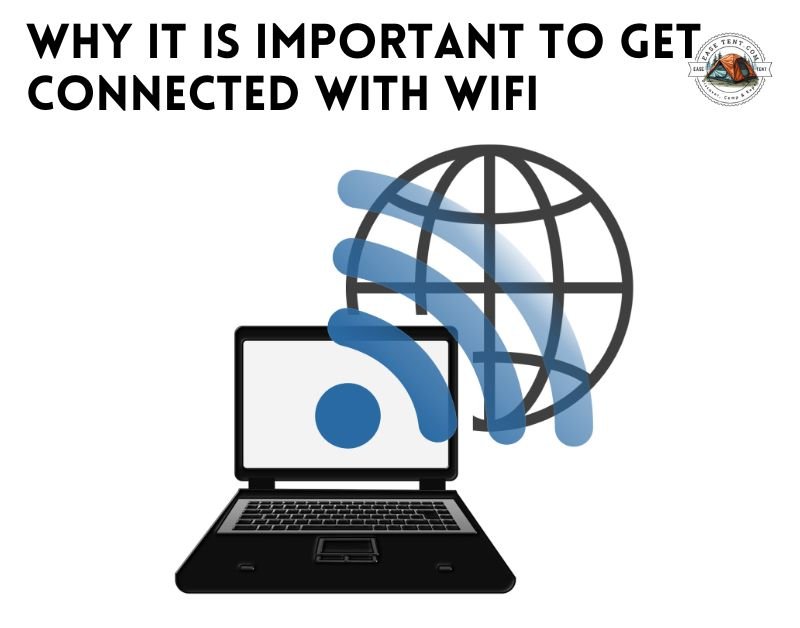
When you’re out in the wilderness and you are surrounded by nature’s beauty, it’s easy to feel completely at peace, as if the rest of the world has disappeared. But let’s be honest—staying connected to the internet, even while camping, has its benefits. Whether you’re catching up on your job work, staying in touch with loved ones, or just enjoying some downtime with your favorite streaming service, having a reliable internet connection can make your outdoor experience even better.
Imagine you’re on a hiking trip and you need to get connected with your team for a quick work update. Who knows when you’re camping in an isolated area and an unexpected situation arises—during that time having the accessibility of internet can be a real lifesaver. Even for relaxation, like sharing those breathtaking views with friends on social media or uploading them on your social media handles (just like I will write blogs and upload them on my website). You can also find the best trails that are nearby so you don’t miss anything during your trip.
Camping is all about appreciating the beauty of nature and embracing the freedom of the outdoors, but that doesn’t mean you have to completely disconnect from the digital world. Whenever I will be in outdoors I use the internet as a bridge between the calmness of nature and the responsibilities of my daily life. So, as you pack your gear and prepare for your next trip, don’t forget to consider how you’ll stay connected—it might just be the key to a more enjoyable and stress-free experience.
Your Priority should be the Campgrounds with Wi-Fi
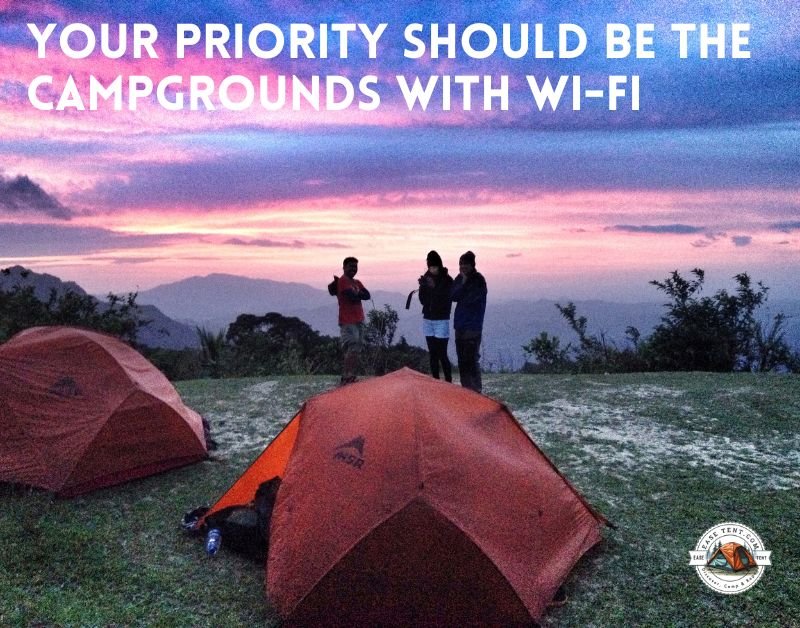
When you’re planning your outdoor trip, choosing a campsite with access to Wi-Fi is one of the smartest moves that you will make before the camping trip.
Just think, you have found a perfect campsite for camp which is huddled in the woods and serene lake. You will set up your tent and start a cozy campfire, while gathering your camping mates around the campfire and start a relaxing song while enjoying the campfire. “I will just love those moments”.
A Campground with Wi-Fi offers the perfect balance between staying connected with your important things while appreciating the great outdoors. It’s a little bit of modern convenience that can make all the difference in ensuring your camping trip is as stress-free as possible. So, when you’re deciding or choosing where to set up your tent don’t forget to consider making Wi-Fi access a priority—you’ll be glad you did.
Mobile Network Coverage
Whenever you’re planning to go outdoors to relax your mind or spend some moments with your loved ones and also want to stay connected with your social media life you just have to look for good SIM card internet coverage.
But this will only be possible when your campsite (where you going to camp) has network signals.
So, before heading to your campground make sure to confirm that they have any network signals, by doing this you won’t regret your decision and you will save yourself from a lot of frustration. Imagine you will set up your tent in a beautiful landscape and you also need internet coverage but you don’t have access to the internet because there’s no signal (Quite frustrating for me).
If your chosen location does have good coverage, you’re in luck. Choosing a campsite with internet coverage will allow you to use your phone to stay connected, navigate trails, or even stream some music while relaxing by the campfire.
Bulk Data Plans
Investing in a bulk data plan during your outdoor trips can be a game-changer for you because these plans offer a generous amount of internet MBs at a better value which might be enough for you to cover all your online needs without worrying about its running out.
Bulk data plans are also great for your trips especially when you’re out in groups.
Choosing the right bulk data plan gives you peace of mind and the flexibility to stay connected as much—or as little—as you want. It’s a simple step that can enhance your camping experience and keep you in touch with the world while you explore all that nature has to offer.
I always buy 40GBs of lyca mobile package and it covers my all use from day 1 to day 2.
Consider data usage requirements and duration of stay
Before buying any package, always make a rough estimate of your data usage requirements and the duration of your stay.
First of all, think about what you’ll need the internet for. Are you going to work remotely, streaming movies, or are you just going to stay connected with your family?
You may also know that each activity uses different amounts of data. For instance, streaming videos or videos on social media can consume a lot more data than browsing the web or sending messages.
Next, consider how long you’ll be camping. A weekend getaway requires less data than a week-long adventure. If you’re only going to be out for a couple of days, a smaller data plan might suffice. But if you’re staying longer, especially in a remote area, you’ll want to make sure you have enough data to cover your entire stay without interruptions.
Personal Hotspots
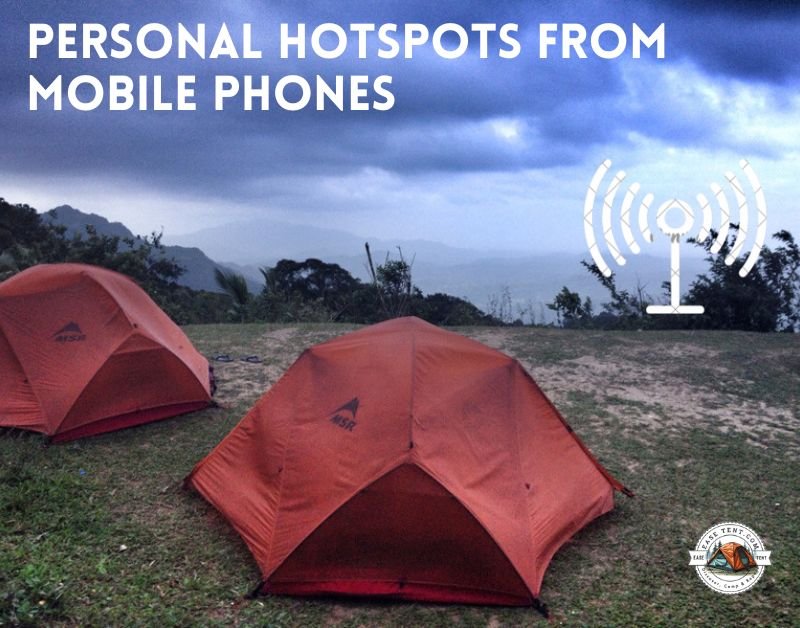
A personal hotspot can also be another option for you if you are going to use SIM card internet.
Personal hotspots allow you to turn your smartphone into a mini Wi-Fi hub, providing internet access for your other devices, like your tablet or laptop. It’s like carrying a little piece of civilization with you, even when you’re deep in the wilderness.
The only disadvantage of the personal hotspot is, that you’ll always need SIM internet to use the hotspot also if there’s any issue with signals your hotspot won’t work very well.
Satellite Internet
Satellite internet is a sort of internet connection that uses satellites orbiting the Earth to provide coverage which is ideal for you if you are in remote or rural areas.
If you don’t have trust in SIM cards or another type of Wi-Fi internet then this will be for you.
It will also be best when traditional internet options aren’t available.
A satellite transmits data between your location and a satellite which makes it accessible almost anywhere.
When to Consider Satellite
Sometimes, when you’re deep in the backcountry, surrounded by towering trees and distant mountain peaks, the usual ways of staying connected just don’t cut it. That’s when you should consider satellite internet.
It is better than all other internet resources because unlike mobile networks, which rely on ground cell towers, satellite internet beams down from space and will reach even the most isolated locations.
Popular Satellite Internet Providers
When it comes to satellite internet, you have a few solid options. Companies like Starlink, HughesNet, and Viasat are leading the way in offering reliable service in places where traditional internet just can’t reach.
Public Wi-Fi and Internet Cafes
When your scheduled spot or campsite is in any town then it has the probability that you will find any café where you can use the internet and do your important tasks.
Finding Public Wi-Fi
Finding public Wi-Fi while camping is often easier than you might think. Many campgrounds now offer Wi-Fi as part of their services, especially at visitor centers, lodges, or communal areas. If you’re venturing into a nearby town, local cafes, libraries, and even some stores they often provide free Wi-Fi.
I’m again repeating that it’s worth doing a bit of research before your trip to know where you can connect, so you don’t have to face any big problems when you need to send a message or check the weather.
Using Wi-Fi Extenders
If you’re staying at a campground that offers Wi-Fi, but the signal doesn’t quite reach your tent, a Wi-Fi extender can be a handy tool. These devices amplify the existing Wi-Fi signal, extending its range so you can stay connected even from the comfort of your campsite. It’s a simple way to make sure you have access to the internet without having to move closer to the source. Just plug in the extender, and you’re good to go.
Cell Signal Boosters
A cell signal booster does exactly what it sounds like—it boosts your cell signal. If you’re camping in a spot where you can barely get a bar of service, a signal booster can take that weak signal and amplify it, and provide you a much stronger connection.
When you set up the signal booster, you’ll notice the difference immediately in your internet speed.
It’s a relief, especially when you’re out in the wild and just want to keep in touch with loved ones or get some work done without interruptions.
Portable Antennas
Portable antennas are another fantastic tool for staying connected in remote areas. These devices are designed to pick up weak signals and make them usable, similar to a signal booster but with a different approach. Portable antennas can be mounted on your vehicle, tent, or RV, and they work by capturing the best possible signal from the nearest cell tower or satellite. If you’re camping in a place with little to no reception, a portable antenna can be the difference between being cut off and staying connected.
Prepare to Work without Wi-Fi
When you’re going out for a camping trip, especially to a remote location, it’s wise to prepare for the possibility of not having Wi-Fi. While being unplugged from the internet can be a refreshing change, it’s also important to plan ahead so you don’t have to suffer when you need to get something done or stay entertained.
Pre-Downloading Content: Preparing Offline Maps, Books, and Entertainment
One of the best ways to prepare for a Wi-Fi-free camping trip is to pre-download all the content you might need.
Before you leave, download offline maps of the area where you’ll be camping. This ensures you can navigate trails and explore without worrying about losing your way.
The beauty of having offline maps is that they work even when your phone doesn’t have a signal, giving you the confidence to wander freely.
And it’s not just about maps—think about entertainment too. Download a few books, podcasts, or movies onto your device before you head out.
Just like me “I will download all of my favorite movies and YouTube videos that I will watch mainly under the stars (Love those moments).
There’s nothing more quite like reading a good book by the campfire or watching a movie under the stars, knowing that you’re fully prepared, even without an internet connection.
Emergency Communication Devices: Using Satellite Phones or GPS Messengers for Emergencies
When you’re camping in areas where Wi-Fi and cell service are unreliable, having an emergency like satellite phones and GPS messengers are the best communication devices and can be a lifesaver for you—literally. These devices are specially designed to keep you connected to your family members and other helplines where other devices usually fail.
A satellite phone allows you to make calls from almost anywhere on the planet, while a GPS messenger can send your location and pre-set messages to loved ones or emergency services.
Tips on How to get high-speed signals in outdoors
Get up high
To get better signals while camping, one of the simplest and most effective tips is to set up your tent at a high point. The higher you go, the better your chances of catching a strong signal.
Setting up at a high point, like a hilltop or ridge, gives you a clearer line of sight to nearby cell towers or satellites. This can help you avoid signal interference caused by obstacles such as trees or buildings, leading to a stronger and more reliable connection.
Plus, a higher location often provides a more panoramic view which will enhance your overall camping experience.
So, next time you’re choosing where to pitch your tent, consider aiming for a higher spot. It’s a simple step that can greatly improve your signal strength and ensure you stay connected while you enjoy the beauty of the outdoors.
Conclusion
In the end, if you make the right decisions before going on your trip will lessen your struggle. By considering options like mobile data plans, satellite internet, and public Wi-Fi, and by using tools like signal boosters and antennas, you can ensure that you remain linked to the outside world, even in the most remote locations. Whether you’re working remotely, navigating through unfamiliar terrain, or just sharing your outdoor experiences with friends, these strategies will help you maintain a reliable connection. So, embrace the adventure with confidence, knowing that you have the tools and knowledge to stay connected and make the most of your time in nature.
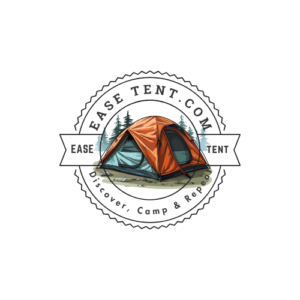
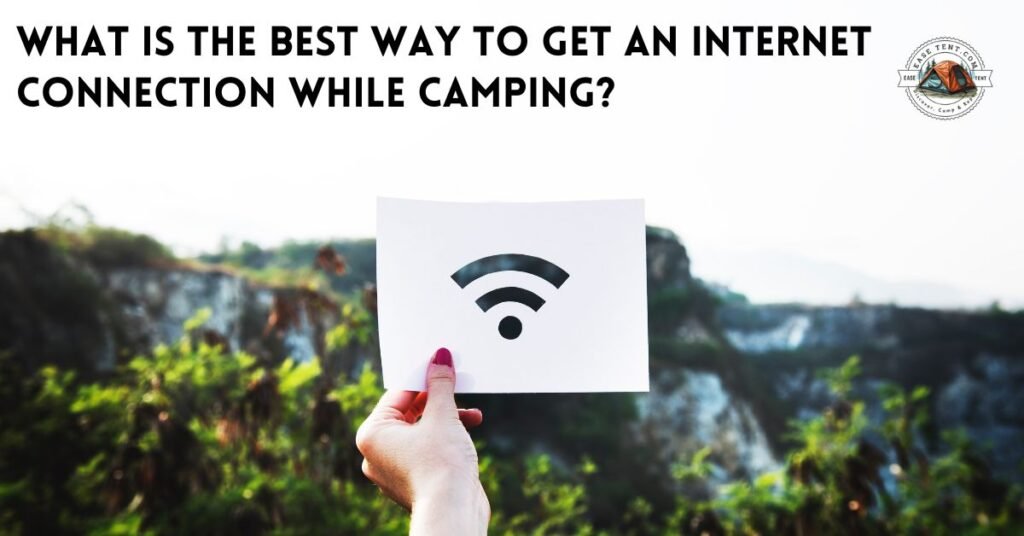
Great o rad full of info article thanks who ever the writer is